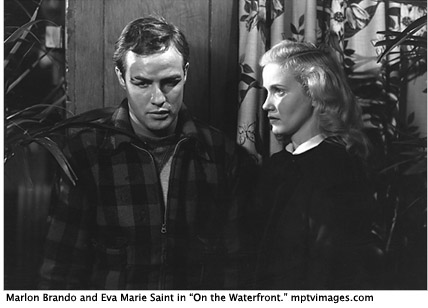Moral of the Story, An Ethicist’s take on the news:
Can You Hate the Artist but Love the Art?
by Randy Cohen
ethicist.blogs.nytimes.com
August 12, 2009

The Issue
Last Wednesday Budd Schulberg died at 95. He was a journalist (particularly astute about boxing), a novelist (“˜”˜What Makes Sammy Run“™”™) and above all a screenwriter: “˜”˜On the Waterfront“™”™ is a glorious accomplishment. He was also a man who named names to the House Un-American Activities Committee. It is not easy to reconcile Schulberg”™s disheartening testimony with his splendid work. Does rejecting the artist mean rejecting the art?
The Argument
The work stands alone. When we are blessed “” or is it cursed? “” with extratextual knowledge, what is it that we know? Personal rectitude does not ensure an elegant prose style. Conversely, if scholars discovered that George Eliot had shot a couple of guys in a drug deal gone bad, not a word of “Middlemarch” would be altered. Why then should our response to those words be subverted? To read a book or watch a movie is to have an aesthetic response to the work, not to make a moral judgment about its creator.
And yet. Knowing about Schulberg”™s (to me) perfidious conduct “” he himself defended his testimony throughout his life “” can affect how we see “˜”˜On the Waterfront,”™”™ adulterating its joys, corrupting even its most famous scene. That”™s psychology more than ethics “” no conscious decision is involved “” but it is particularly potent psychology.
The contracts of big-time actors and athletes often include a morals clause, less an expression of principled concern for the virtue of the performer than economic concern for the psychology of the audience: many fans won”™t pay to see a miscreant perform. Michael Vick”™s professional future hinges on how N.F.L. team owners assess that psychology.
Call it the Woody Allen Quandary. In the wake of the revelation of his involvement with Soon-Yi Previn, the young adopted daughter of Mia Farrow, then his paramour, some people refused to attend another of his movies. Feelings ran high. A roster of headlines from 1992, when the affair became public, includes the words “fallen icon,” “incest” and “enough to bring banishment or death in biblical times.” And this is a list of articles that ran in The Los Angeles Times, not The National Enquirer. Would you like some popcorn?
Allen has appeared in many of his movies, often as a character apparently based on himself, making it even harder to disassociate the artist and the art. Something related affects our response to “˜”˜On the Waterfront,”™”™ a story driven by Terry Malloy”™s deciding whether or not to testify about people he knows. Some critics see the movie as Schulberg”™s apologia (an interpretation he rejects in this fascinating interview).
Unless you were eager to date Woody Allen or pal around with Budd Schulberg, why would you care what they were like as people? Few who renounce Woody Allen movies have a chance to renounce Woody Allen: it”™s not as if he”™s inviting them over for dinner. Budd Schulberg and I were in a union together, the Writers Guild of America “” together in the sense that we both attended union functions at a time when I had my first TV staff-writing job and he”™d had a brilliant career for decades. He spoke at a W.G.A. strike meeting in 1988, and I found myself more inspired by his passionate rhetoric than resentful of his past politics. But I was only a small child when he testified before HUAC. My response to those events is necessarily theoretical, distanced; my response to his speech and to “˜”˜On the Waterfront”™”™ is visceral, immediate. Last year our union honored Schulberg; I”™m glad it did.
It”™s hard to be a good person; it”™s hard to produce great work. Most of us accomplish neither. To demand both might be asking more than human beings are capable of. To deprive oneself of great work created by a less-than-great person seems overly fastidious.
Peter Shaffer poses a version of this perplexing question in his play and screenplay “˜”˜Amadeus“™”™: can a bad man make great art? For Shaffer, the answer is unambiguously yes, to the chagrin of Mozart”™s rival Salieri, who thought himself the better man yet knew himself the inferior composer. It drove him to despair. Or, Shaffer suggests, to something worse.
It would be so much simpler if all artists lived if not honorably then discreetly. We know remarkably little about Shakespeare”™s life; perhaps that helps us respond so fully to his work. Or perhaps Shakespeare himself got it wrong when he had Mark Antony declaim:
The evil that men do lives after them,
The good is oft interred with their bones;
Maybe the evil that men do is interred with their bones. What lives after them is the screenplay to “˜”˜On the Waterfront.”™”™
